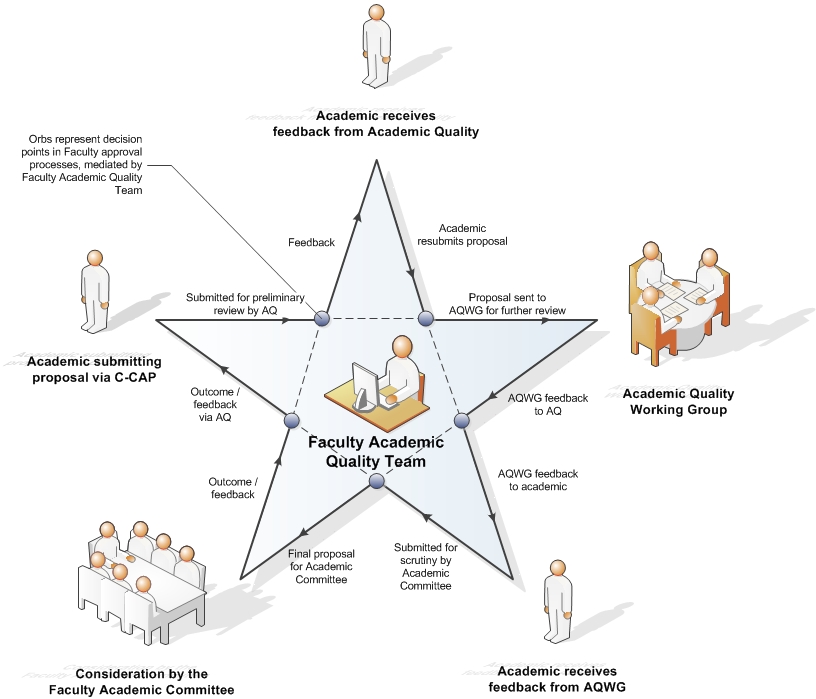In a previous blog post we noted how academics were at the centre of the curriculum design process. This is to be expected because, after all, they provide the raw materials that feed into the curriculum approval process. However, I thought it would be worth taking time to briefly note the importance of academic quality teams as, certainly within the University of Strathclyde and most other universities, they remain the unsung heroes of the curriculum approval process.
Faculty academic quality teams are at the centre of - and are critically important to - curriculum approval processes. This importance is reflected in the design of the Class and Course Approval Pilot (C-CAP) system, which includes tools and functionality designed to support their quality assurance role. Academic quality teams are singularly responsible for administrating and managing the curriculum approval process and therefore have responsibility for tracking, monitoring, providing on-going feedback to academics, controlling the status of proposals, assigning proposals for academic review, and so forth. Occasionally they also sanitise proposals that have been submitted which might be a little rough around the edges. Administering this functionality exposes quality staff to an extra layer of C-CAP system complexity. The back-end administration of the curriculum approval process via C-CAP is therefore mediated at a faculty level by academic quality staff and is best understood, not through the process diagrams that have come to dominate our understanding of tech-supported curriculum design, but by a star-shaped interpretation of faculty level approval processes, as illustrated below.

Academic quality teams are at the centre of the star which - if we are to continue the cosmic metaphor yet further - is part of the wider universe of curriculum design and approval. They are at the centre of all faculty level curriculum approval processes and also govern or facilitate many of the decision points or approval actions. Academic quality teams were always central to faculty level approval processes, but this centrality was never formalised in the previous state (i.e. before C-CAP) and as a consequence the process remained mysterious to many stakeholders. The development of C-CAP has changed this by making explicit a curriculum approval process that was hitherto mythic at times and plagued by elements of tacit practice. The lack of a formal or universally recognised process meant that faculty level approval was difficult for quality teams to manage and to control; it also encouraged some academics to subvert due process and made the role of academic quality staff, as the custodians of academic quality assurance, difficult to discharge.
The final strand of evaluation activity ended in late-May and the associated report will be available on the PiP website soon; suffice to say that the findings highlight the transformative impact C-CAP has had within the institution and, in particular, for those involved in academic quality. C-CAP was found to have increased the level of control quality teams had when managing academic quality and faculty level approval processes, something that was sorely lacking under the previous state. The increased control given to academic quality teams by C-CAP - something that is reflected in the "star shaped" interpretation of the approval process - was therefore welcomed for its process transparency, but also as a better mechanism for controlling, monitoring, structuring, minimising process ambiguity and minimising errors in the approval process. And, of course, all of this aids the maintenance of academic quality, without which, curriculum design would ultimately suffer. But what it also highlights is not only the importance of academic quality teams within the curriculum design and approval universe, but their importance as key change agents. Their centrality to the approval process and their influence on curriculum design (via academics) is such that they are the stakeholders above all others who interact with C-CAP the most, are the most exposed to its functionality and benefits, and are therefore best placed to advocate its wider adoption. The findings that academic quality staff have warmly embraced C-CAP is therefore welcome news and indicates that they are, to all intents and purposes, a conduit or even a Trojan Horse for true institutional change.